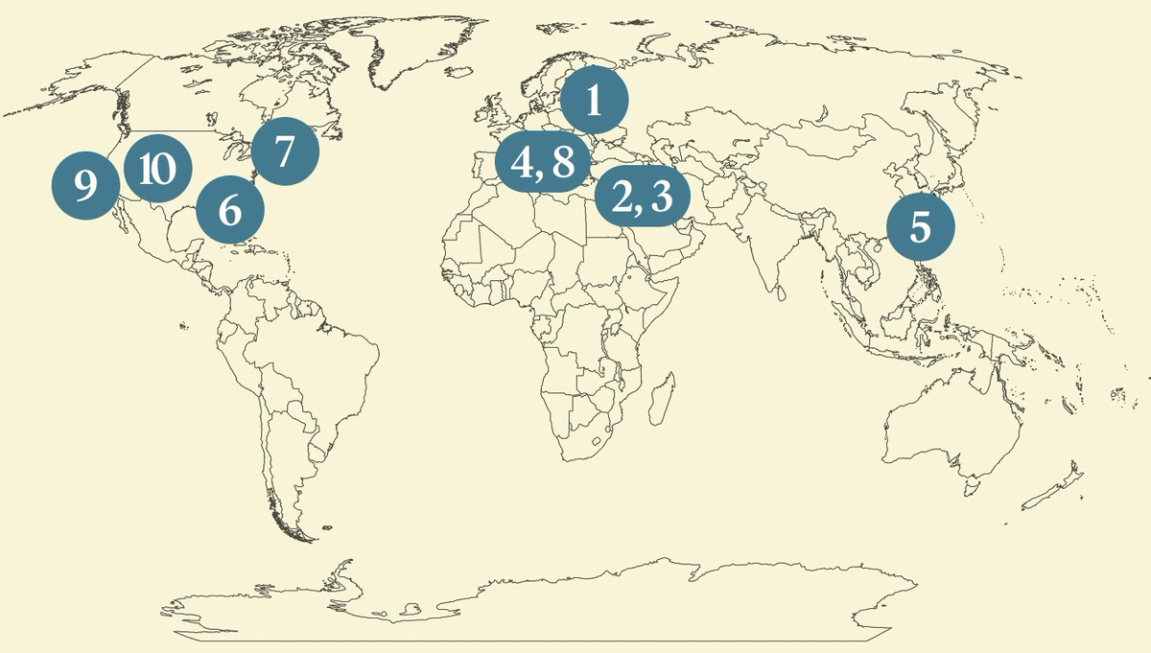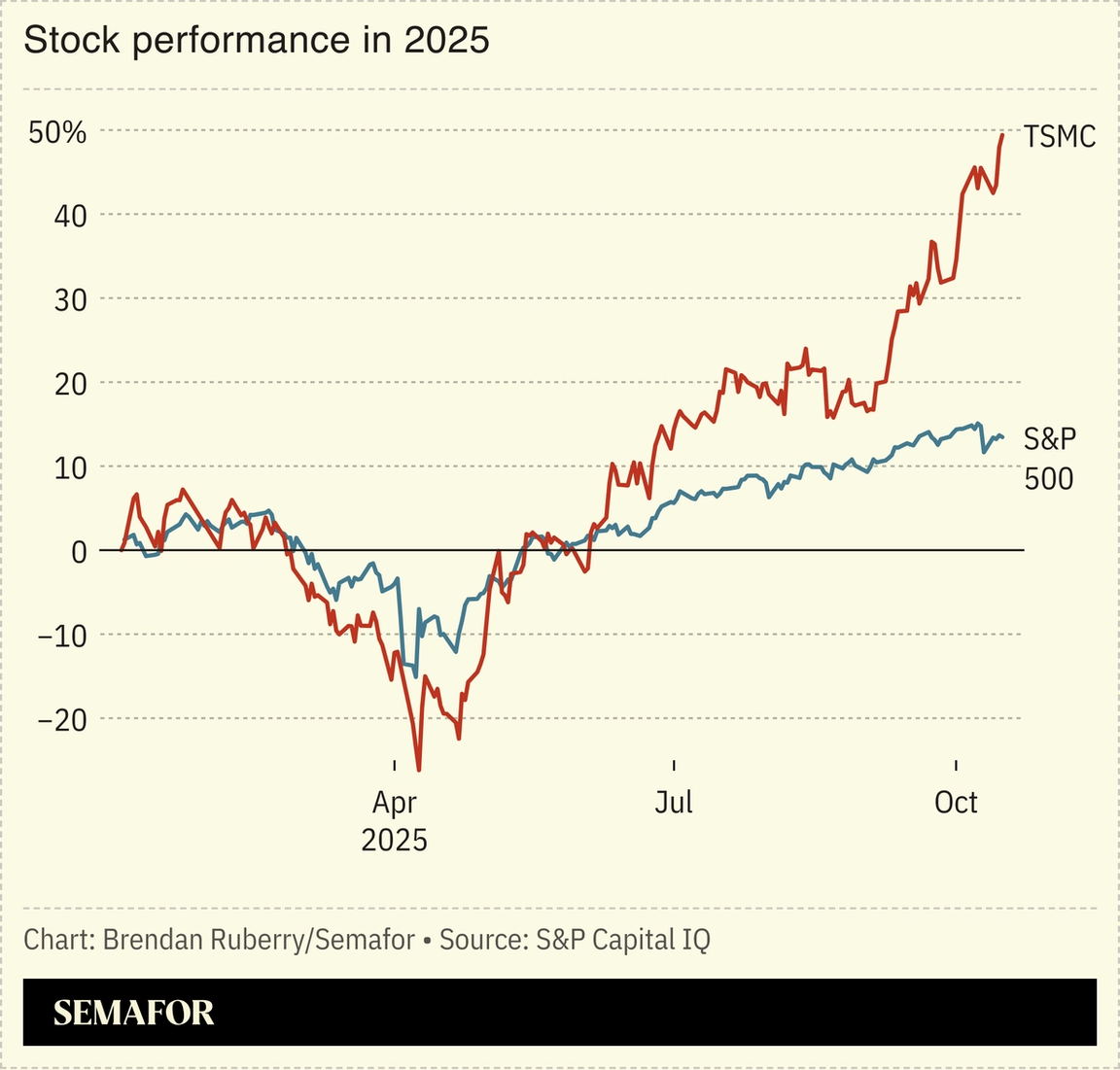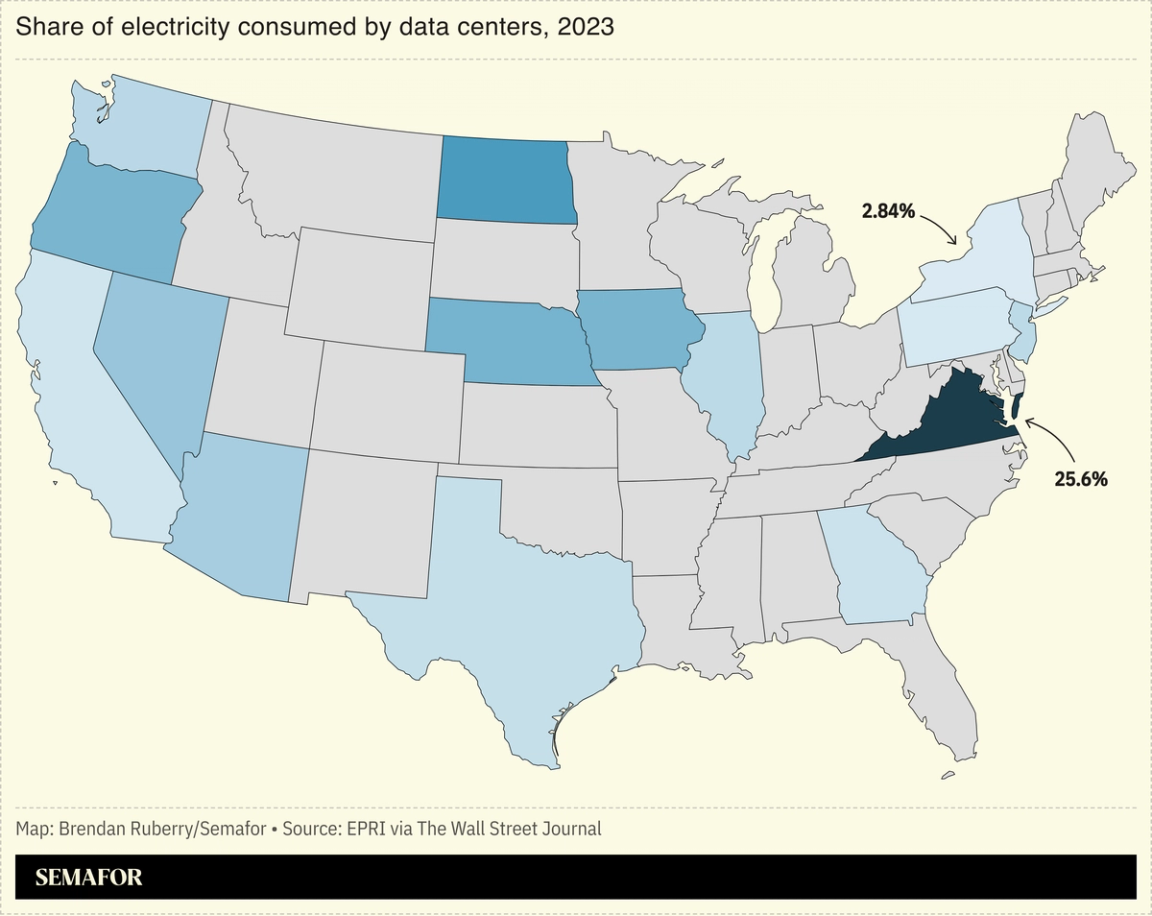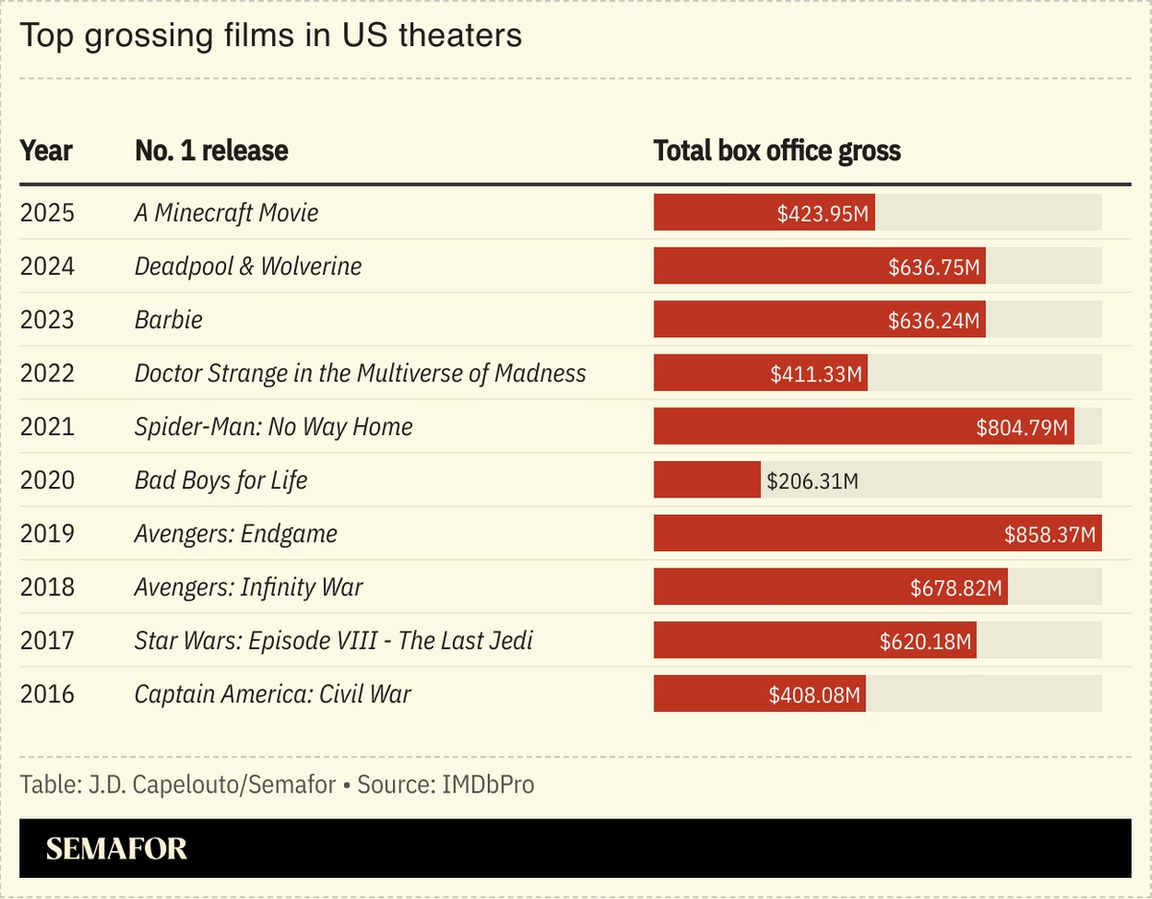| | Donald Trump plans to meet Vladimir Putin again, experts warn of an AI-energy gap, and aliens are to͏ ͏ ͏ ͏ ͏ ͏ |
| |   BUDAPEST BUDAPEST |   DAMASCUS DAMASCUS |   TAIPEI CITY TAIPEI CITY |
 | Flagship |  |
| |
|
The World Today |  - Trump floats Putin meeting
- The ‘Disrupter in Chief’
- Syria’s economic plea
- Greece’s data lesson
- TSMC raises outlook
- ‘Bring Your Own Power’
- US airport havoc
- Italy’s high-speed rail
- AI hysteria is boring
- Aliens are bored
 A surprisingly modern Gilded Age sculptor, and Semafor’s Andy Browne on the US paying the price for rare earth complacency. |
|
Trump plans to meet Putin again |
 Kevin Lamarque/Reuters Kevin Lamarque/ReutersUS President Donald Trump said he will meet Russia’s Vladimir Putin in Budapest for talks aimed at ending the Ukraine war, though he didn’t specify when. The announcement came after the two leaders held a call on Thursday, a day before Trump hosts Ukraine’s Volodymyr Zelenskyy at the White House. Trump has said the conflict is his next foreign policy priority following the Israel-Hamas ceasefire. For Zelenskyy, who is set to request US air-defense and long-range missile systems, another Trump-Putin summit is a “curveball,” a BBC journalist wrote. The Budapest talks suggest Washington is “backing down from attempts to get tougher on Russia… in favor of a so far illusory peace deal,” the Financial Times’ Moscow bureau chief wrote. |
|
Trump’s disruptive second-term playbook |
 Jonathan Ernst/Reuters Jonathan Ernst/ReutersDonald Trump is notching domestic and foreign policy wins in his second term because of fewer constraints and a more confrontational approach, commentators said. At home, the US president has sought to expand his powers and ordered investigations against his foes— his former national security adviser John Bolton was indicted Thursday — a result of aides imposing fewer guardrails. “We are now seeing how a truly unshackled Trump uses his power,” The New York Times wrote. But the “Disrupter in Chief” has delivered “transformational results,” historian Niall Ferguson argued. His diplomatic Middle East success, marked by the Gaza ceasefire, is because he better understands the limits of American power than in his first term, The Economist wrote, embracing uncertainty rather than attempts at sweeping change. |
|
Stakes are high for Syria rebuilding |
  Paul Morigi/Getty Images for Semafor Paul Morigi/Getty Images for SemaforSyrian officials tasked with restarting the economy insisted they need to assemble new institutions, and not merely rebuild those that led to the country’s collapse. “If we miss this opportunity, Syria is gone,” Damascus’ economy minister said Thursday at Semafor’s World Economy Summit, comparing the country to a newborn baby, emerging from the “wreckage” of a 15-year civil war. Decades of sanctions meant Syria’s banks and businesses were never integrated into global financial systems, and companies and the government lack the expertise to quickly develop policies and practices to do so. The central bank governor called for “technical assistance” from partners, and while investors are eyeing Syria after Washington lifted sanctions, some are cautious: “Maybe later,” a BNY executive told Semafor. |
|
Greek crisis holds data lessons for US |
  Paul Morigi/Getty Images for Semafor Paul Morigi/Getty Images for SemaforThe Greek debt crisis underscores the need for reliable and independent economic data, the country’s finance minister said Thursday, as the US grapples with a lack of confidence in official numbers. Investors’ inability to trust government figures because of data falsifications and severe revisions partly contributed to Greece’s financial crisis starting in 2009. US economic data is currently facing similar questions following US President Donald Trump’s firing of a top labor statistics official after the agency published underwhelming jobs figures. “What you can’t measure, you can’t reform,” Greece’s Kyriakos Pierrakakis said at Semafor’s World Economy Summit. But “there were always questions” about the reliability of US economic data, a top US Treasury official noted at the summit. |
|
TSMC raises revenue target |
 Taiwan Semiconductor Manufacturing Co. raised its revenue target for this year, in an endorsement of the “AI megatrend,” its CEO said. AI demand is “stronger than we thought three months ago,” said C.C. Wei, who has led the chipmaker since 2018. The higher goal reflects the company’s confidence despite US restrictions on China, which threaten to impact the business of TSMC’s customers like American chip giant Nvidia. “Even without China, there’s very robust demand for their platforms,” a Bloomberg analyst said. TSMC executives have also downplayed the impact of US tariffs as the company ramps up its global expansion. President Donald Trump has called for more domestic manufacturing; Wei said TSMC plans to scale up US chipmaking. |
|
Huge AI-energy gap, expert warns |
  A former US energy czar warned of “a huge gap on energy and AI” as power-hungry tech companies compete for AI dominance. That could morph into a crisis, Amos Hochstein, who now focuses on AI at TWG Global, said at Semafor’s World Economy Summit, pointing to a “culture clash” between a full-steam-ahead tech sector and utility companies that adopt a slower approach. US tech firms are trying to bridge the energy gap themselves by building power plants to fuel their data centers. The “Bring Your Own Power” boom, The Wall Street Journal wrote, includes a gas-fired generator in Texas, gas turbines in Tennessee, and fuel cells in California — “driving an energy Wild West that is reshaping American power.” |
|
Shutdown heaps pain on US airports |
 Megan Varner/Reuters Megan Varner/ReutersAlready strained US airports are being thrown into chaos by the federal government shutdown. More than 6,000 flights are currently delayed each day, almost double the historical average for October, and security lines at airports are longer. Some major airports have had to operate without air traffic control for hours at a time, as the shutdown exacerbates the pressure on an aviation system plagued by underfunding, weak oversight, and increased demand. Half a million employees have been furloughed across the government, and although air traffic controllers are required to work, many are using their banked sick leave to avoid working without pay, The Verge reported. The Federal Aviation Authority already faced severe understaffing before the shutdown. |
|
Railway points to south Italy renaissance |
 Antonio Denti/Reuters Antonio Denti/ReutersItaly will extend its high-speed rail network into the country’s south, part of a growing turnaround in the historically underdeveloped region. The new 90-mile line will cut coast-to-coast journey times from four hours to two. Southern Italy is among the poorest parts of the eurozone, and has seen decades of population loss. But in recent years workers have begun to return to regions such as Calabria and Campania, while infrastructure developments have boomed, Reuters reported: For three years running, the south’s GDP growth has outstripped the rest of the country, which itself is doing well compared with elsewhere in Europe. But progress may be on shaky ground, Le Monde argued: Italy is heavily reliant on EU funds and faces a severe demographic decline. |
|
‘Evil AI’ films already feel stale |
 Cinemas are awash with big-budget flicks about malicious AIs wreaking havoc on humans. The problem, according to The Hollywood Reporter, is that the trope is becoming stale — just as real-life warnings about AI’s safety are growing more urgent. This year, Megan 2.0, Mission Impossible: Dead Reckoning, |
|
|